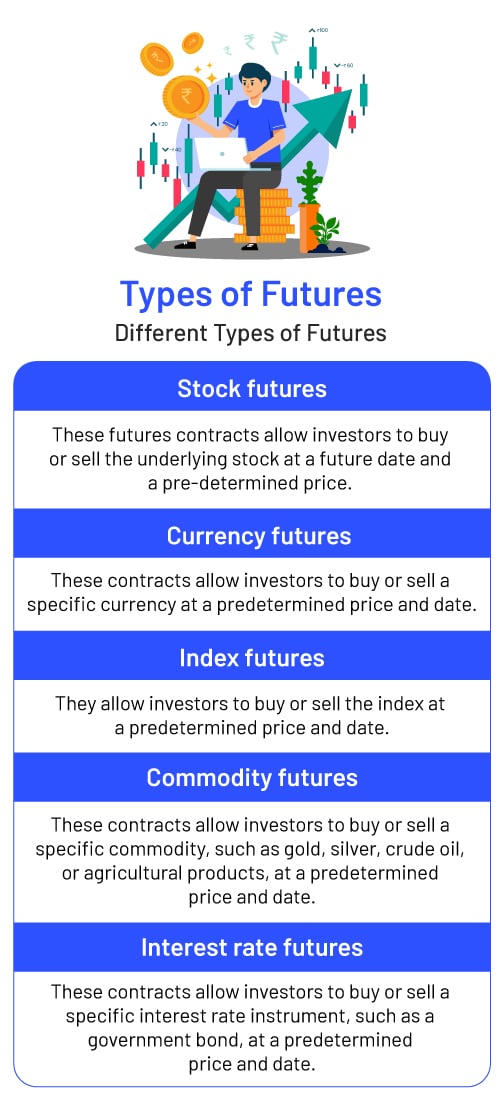Futures are widely used in various markets to hedge against price volatility, and by speculators who want to take advantage of price movements. A futures contract gives a buyer or seller the right to buy or sell a particular asset at a specific future price.
There are many types of futures, in both the financial and commodity segments. Some of the types of financial futures include stock, index, currency and interest futures. There are also futures for various commodities, like agricultural products, gold, oil, cotton, oilseed, and so on.
Let’s look at different types of futures.
Stock Futures
Index futures first appeared in India in the year 2000. These were followed by individual stock futures a couple of years later. There are several advantages of trading in stock futures. The biggest one is leverage. Before trading in stock futures, you need to deposit an initial margin with the broker. If the initial margin is, say, 10 per cent, you can trade in Rs 50 lakh worth of futures by paying just Rs 5 lakh to the broker. The larger the volume of transactions, the higher your profit. But the risks are also more significant. You can trade stock futures on stock exchanges like the BSE and NSE. However, they are available only for a specified list of stocks.
Index Futures
Index futures can be used to speculate on the movements of indices, like the Sensex or Nifty, in the future. Let’s say you buy BSE Sensex futures at Rs 40,000 with an expiry date of the month. If the Sensex rises to 45,000, you stand to make a profit of Rs 5,000. If it goes down to Rs 30,000, your losses, in that case, would be Rs 5,000. Index futures are used by portfolio managers to hedge their equity positions should share prices fall. Some of the index futures in India include Sensex, Nifty 50, Nifty Bank, Nifty IT etc.
Currency Futures
One of the different types of financial futures is currency futures. This futures contract allows you to buy or sell a currency at a specific rate vis-à-vis another currency (Euro vs USD, etc.) at a predetermined date in the future. These are used by those who want to hedge risks, and by speculators. For example, an importer in India may purchase USD futures to guard against any appreciation in the currency against the rupee.
Commodity Futures
Commodity futures allow hedging against price changes in the future of various commodities, including agricultural products, gold, silver, petroleum etc. Speculators also use them to bet on price movements. Currency markets are highly volatile and are generally the domain of large institutional players, including private companies and governments. Since initial margins are low in commodities, players in commodity futures can take significant positions. Of course, the profit potential is enormous, but the risks tend to be high. In India, these futures are traded on commodity exchanges like the Multi Commodity Exchange (MCX) and the National Commodity and Derivatives Exchange.
Interest rate futures
An interest rate future is one of the different types of futures. It’s a contract to buy or sell a debt instrument at a specified price on a predetermined date. The underlying assets are government bonds or treasury bills. You can trade these on the NSE and the BSE.

Frequently Asked Question
FAQs
What are the different types of futures contracts?
Futures are available for different underliers. Commonly we associate futures with commodity trading, but futures are available for other asset classes too. The different types are,
- Stock futures
- Currency futures
- Index futures
- Commodity futures
- Interest rate futures
What is a lot in futures trading?
The lot refers to the number of units (quantity) of a financial instrument available in the bourses for buying and selling. In the stock market, a lot refers to the number of stocks you buy/sell in a single transaction. A simple example of lot size is when you buy a packet of chocolates containing 100 units. The lot size is 100 in this case.
The concept of lot size is associated with derivatives. It helps with the regulation of price in the market. In the derivative market, lot size of futures and options is decided by the exchange from time to time. The lot size varies between different types of futures contracts.
Are futures settled daily?
Futures are settled daily as well as on the expiry date.
The daily settlement process, called marking to market, is a complicated process of determining the profit or loss after each trading day.
During the trading hours, the underlier price fluctuates depending on market demand. After trading hours, profit and loss are calculated and the accounts settled, called ‘settling of differences’ between long and short positions.
Why would someone buy a futures contract?
Futures contracts allow traders to speculate in the direction of the market. Trading in futures contracts involves several advantages such as easy pricing, high liquidity, and risk hedging. These are highly leveraged instruments which allow you to increase your profit potential with margin investment.
The futures market is linear, and unlike options, the margin requirement is well-defined, following a simple pricing model determined based on the cost of carrying of the spot price.




